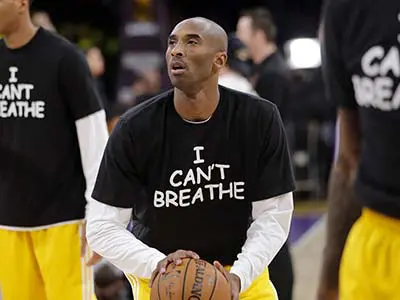RISE PERSPECTIVE
July 7, 2020
My Heart is with you, My Pain is for you
By Madeline Bachelier

For the past couple of weeks, I have woken up each morning feeling heavy.
My thoughts and emotions have spiraled seeing the amount of information, resources, and support sparked from the recent deaths of Ahmaud Arbery, Breonna Taylor, and George Floyd. I see and feel the amount of energy. The pure energy of limitless work to demand accountability for police brutality, elevate the movement and voices of Black Lives Matter and further educate ourselves on issues that continue to steal the opportunities and lives of innocent people.
I am a Mexican-American woman who grew up learning two cultures, two languages, and practically two different ways of life. Although a person of color, my experiences dealing with implicit bias, microaggressions, prejudice and racism do not compare to the daily challenges my Black friends and peers endure.
Knowing that, my tears and heavy chest left me thinking, "Why am I grieving so much? Why are my emotions at an all-time high with anger and frustration?"
At the time I did not realize that the pain and frustrations I felt were moments of empathy. Truthfully, as a way to make sense of all this, I thought my emotions were inappropriate and that I should channel that energy into action.
But then I read this piece from Morgan Harper Nichols, writer, musician, and artist who eloquently expressed empathy as:
Let me hold the door for you.
I may have never walked
A mile in your shoes,
But I can see that
Your soles are worn
And your strength is torn
Under the weight of a story
I have never lived before.
So let me hold the door for you.
After all you've walked through,
It's the least I can do. – Morgan Harper Nichols
As I processed the news each day, seeing protestors take to the streets throughout the nation, and listen to the challenges my friends and colleagues have been facing, I could not help but think how much empathy reveals who we are as people.
Empathy says, "I see you, and I feel for you." Empathy is the first step to connection, and has no bounds in its ability to shift behaviors and convey a collective sense of support that stretches beyond all limits.
When we think about practicing empathy what comes to mind? In most cases, empathy does not always have to look the same across different situations or be expressed to the same degree. It is important to think of empathy through other acts of appreciation, as well.
RISE teaches four skills to empathy, introduced by Dr. Brené Brown:
- Perspective Taking
- Staying out of judgement
- Recognizing emotions in others
- Communication to others that you recognize their emotion
We may not always fully understand what someone is going through, but we can first try to connect with them through practicing these four skills. If at one point you also experienced the same feeling but not necessarily in the same situation, that in a sense is building empathy.
Empathy leads to education, and until you expose yourself to different perspectives and experiences that may challenge your privilege and how you use it, you may just live in a comfort zone that simply expresses sympathy, but never really leads to action.
A study published by the Greater Good Science Center at UC Berkeley suggests, "cognitive empathy," or knowing how another person feels and thinks is not enough to inspire action. What does is, ‘'emotional empathy," which urges feeling the same emotions of other people as if they are your own.
For years, athletes have evoked and expressed different forms of empathy through their activism as a way to raise awareness around important social justice issues.
In 2014, for example, NBA stars such as LeBron James, Derrick Rose, and Kobe Bryant wore "I Can't Breathe" T-shirts during warm-ups to raise awareness of police brutality following the killing of Eric Garner in New York. Social media posts of athletes wearing these shirts have resurfaced in light of Floyd's murder, and athletes like James and countless others continue to speak out on matters of race and social justice.

Nationwide movements cannot grow with only those directly impacted by the cause. They require diverse support and a coalition of people and groups. That, is built with empathy. It's empathy that compels people to fight for the plights of others and sparks momentum to address critical social issues. Athletes wearing "I Can't Breathe" t-shirts or sharing their personal stories puts a human voice and face on the fight against racism and police brutality, and helps those who may not be personally impacted by those issues connect to the cause.
But one doesn't need a national platform to build or evoke empathy. In your own school, community or office (virtual or in-person), anyone can be a leader in this space.
Diversity and inclusion expert, Dr. Janice Gassam (2018) lists different tactics for leaders to build empathy in and out of the workplace:
- Listen. Research indicates that listening to other people from different walks of life talk about their experiences and journey through life, difficulties, hardships, and triumphs can impact our empathy levels.
- Slow Down. Listening is very important, but unless we slow down and stop multi-tasking, it is difficult to really hear the differing experiences of others.
- Be Curious. Individuals that are more curious tend to also be more empathetic. Make a concerted effort to interact with people who are different than you, and take time to learn about their stories. Don't be afraid to ask questions. Asking questions allows the other person to feel like their voice is heard and valued.
- Volunteer. The act of volunteering may actually increase our empathy levels. Organizations should incorporate volunteering opportunities into the corporate structure to allow employees to feel like they are making a difference and impact.
The purpose behind practicing empathy can mean working towards a common goal. At RISE, we recognize starting with empathy opens up conversations that build trust and confidence. Moreover, empathy reaches a level of connection that we often strive for within our relationships with family, friends, and our community.
For me, showing vulnerability and empathy towards someone and the struggles they face reveals another kind of understanding. The kind that screams, my heart is with you, my pain for you, and I am motivated to advocate for you.
Madeline Bachelier is Manager, Partnerships at RISE. In this role, she works to expand RISE's relations with college athletic departments and professional teams, and helps seek new opportunities to empower the sports community to be leaders on matters of race relations, diversity and inclusion. She holds a Bachelor's Degree in Marketing from the University of Arizona.
Our
Partners
Stay
In Touch
Follow us on social media.